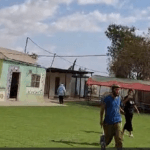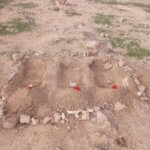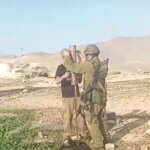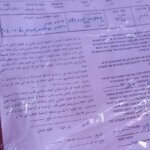Arab Al Ka’abneh elementary school needs water and electricity
Founded in 1958, Arab Al Ka’abneh elementary school has always faced adverse circumstances. Water and electricity have always been in short supply and even now the scarcity of these basic resources is still the main problem for the 65 children who go there.
Most of the children, from kindergarten to ninth grade, are descendants of Bedouin families that used to move between places like Ramallah, Jericho and Jerusalem to find resources to feed to themselves and their sheep.
According to Mahmoud Germe the Headteacher, after 1967 Israel started to build settlements around them and left just two areas for the local population to live in: Arab Al Ka’abneh and Der Deboan. People used to live in Arab Al Ka’abneh in the winter and go to Der Deboan in the summer, because of the bad weather. Since 2005 they have stayed in Arab Al Ka’abneh all year, but they are struggling. “In summer, the water gets so hot that we can only use it to take a shower, because it’s really hard to drink”, he explained.
Classes start at 7am and go on until 1pm, but the rooms get very hot in the summer, so the teachers have to take the pupils outside. On top of that, every year they have to replace the plastic material on the roof due to sun damage.
The school has 11 classrooms. In the beginning, there were just tents, but in 1986 they managed to build the first classroom with the help of organizations and the community. After 1994, the Palestinian Authority also started to support the school with more rooms (totalling nine) and transportation. “They have a bus, but the driver leaves the children on the road to walk here”, complains Mahmoud.
More recently the charity ACF International has built two more rooms for the 12 kindergarten pupils who didn’t have a proper space to learn. Israel has issued a demolition order but the judge for the case has not yet made a decision.
“Besides water, we need more infrastructure for the kids. It’s important to put an air conditioner in the rooms, to build bathrooms, and to improve the sports court, made of cement, which is dangerous for the kids”, Mahmoud says.
The school has two solar panels, but only one is working, which is not enough to run everything that needs power and can be used just twice a week – the fridge, for example, can’t be turned on. Sometimes teachers use a projector in their lessons and use power for that, but only the secretary who goes there three times a week can use the computer to update school data.
Jordan Valley Solidarity is one of the organizations that supports Arab Al Ka’abneh school with maintenance. “In March, we plan to build one more solar panel with ACAD, bigger than the others, to improve the power to the school”, the NGO co-ordinator Rashed Khudiri says.










